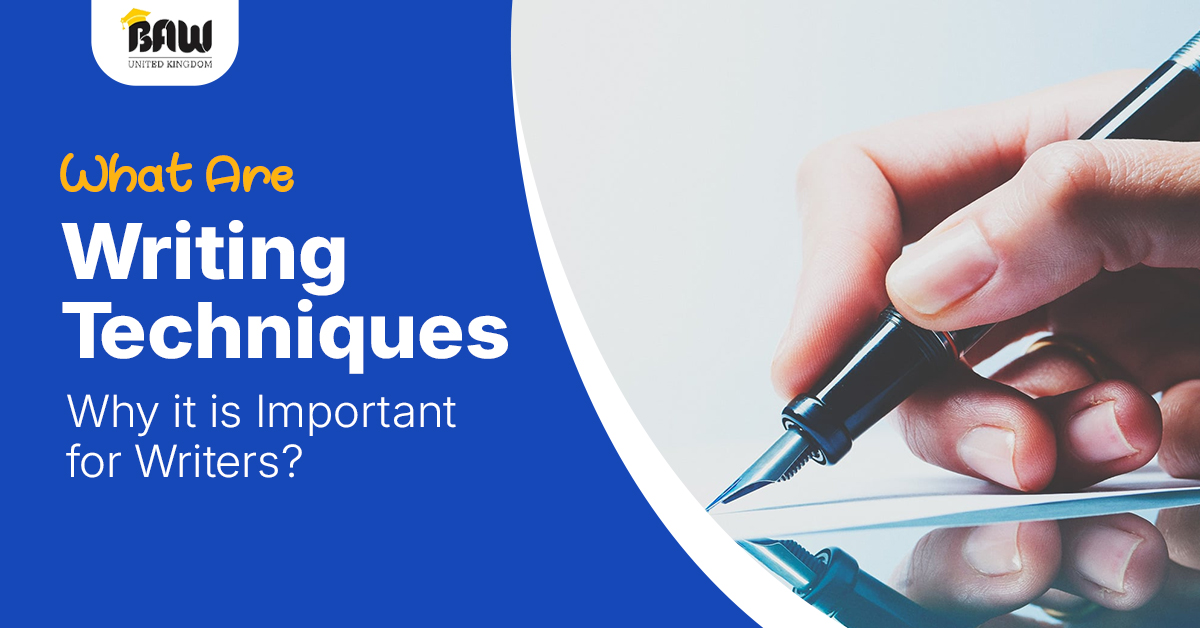
Writing is much more than ink on paper. Rather, it is an art, a skill, and at times even a science. Techniques for writing can thus turn out to be the deciding factor in whether you draft an essay, fabricate a story, or end such an assignment on a good note with, say, BestAssignmentWriter.co.uk. But what are they in actuality, and why should every writer care? Let's find that out the easy way: Conversationally. Pretty much.
In their simplest form, writing techniques are properties that help writers clearly present their writing with interest and with effectiveness. It is, so to speak, a secret ingredient which turns ordinary text into something to which readers can relate.
Writers have a whole bag of tricks, depending on whatever they wish to accomplish. Some of the types of writing techniques that shine in writing, in terms of what they are meant to achieve, are:
These assist in narrating a tale interestingly. Foreshadowing, flashbacks, and point of view are some examples. Ever wondered why a story captures your attention at the beginning and makes you wonder? That's narrative technique at work.
With sensory details, metaphors, or similes, descriptive methods create vivid images. Rather than "It was a sunny day," you could use "The golden sunlight poured over the hills, drying the morning dew."
Ideal for essays or arguments, these strategies persuade readers with logic, emotion, or credibility. Consider rhetorical questions, repetition, or anecdotes to drive your message home.
Structural methods emphasise organisation. Chronological organisation, cause-and-effect organisation, and problem-solution organisation make your writing read smoothly.
Tone, diction, and literary methods such as irony, symbolism, or alliteration lend your writing personality. They establish your voice as identifiable and your work as fun to read.
A combination of these methods ensures your writing doesn't sound dull or monotonous.
Apart from techniques, authors have different writing methods to assist them in their work. Some of the most common ones are:
These methods of writing make it possible to manage relatively higher levels of difficulties and keep the ideas crisp and strong. This is highly beneficial for almost every student availing assignment writing services. Trying these methods builds confidence. Ultimately, writers come to know the procedure that suits them best for writing smoothly and effectively for almost every writing project.
If techniques are the weapons, then writing tactics are the clever ways of using them. Here are some strategies that every writer can attempt:
Techniques such as these make your writing better, more interesting, and easier to read.
By these examples, applying these techniques to one's own writing becomes fairly easier, whether it is related to academic writing or creative writing.
So, what's the thing about these techniques? They make writing effective, said only. Helps to
Even for students using assignment writing services to complete their work, mastering some of these techniques is the differentiation between mediocrity and brilliance.
Assignments need the correct methods for writing. Academic work requires precision, clarity, and organisation. The following methods work:
Sites such as BestAssignmentWriter.co.uk assist students in these techniques, providing professional assignment writing services. They assist in ensuring clarity, correct technique use, and academic compliance.
Not every technique fits into every piece of writing, and here is a simple plan of action for using such techniques:
Even trying writing strategies you wouldn’t normally use can turn boring assignments into exciting challenges. You might discover techniques that suit your style perfectly. Over time, this flexibility will make your writing sharper, more creative, and much more effective for any reader.
Here are really handy tips to write more effectively:
The student unable to cope within the short time leftover can even seek instances from these companies for quick essay writing, and learn by using the aid of reinforcement of the techniques.
Mastering techniques isn’t just for writers or students. The benefits ripple into many areas:
Even reading assignment writing service reviews can teach lessons about what makes writing strong and effective in academic settings. Applying these insights sharpens skills for future work across subjects and careers.
The tools that give writing meaning and memorability are writing techniques, not just fancy words or intricate syntax. Being aware of and applying these techniques can elevate your writing, whether it be essays or creative pieces.
By experimenting with different writing styles, writing tactics, and writing examples, you may create works that not only communicate your ideas but also captivate readers.
Whether you're studying alone or using services like BestAssignmentWriter.co.uk, using these techniques will guarantee that your writing is compelling, interesting, and clear. Gaining proficiency in these will enable you to connect, persuade, and make an impression in addition to writing.
They make ideas easy to understand, grab readers' attention, and increase creativity.
Writers use techniques to create suspense, build imagery, or convince readers.
Various methods with different functions: narrative, descriptive, persuasive, structural, and stylistic methods increase clarity and interest.
Writing skills play a crucial role in academic achievement, workplace communication, and creativity.